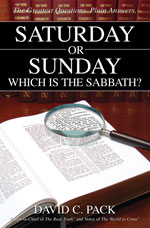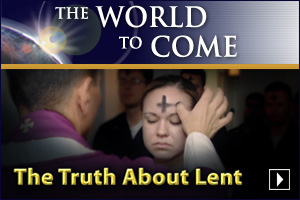King David, himself a former shepherd, begins this Psalm with, “The Lord is my shepherd,” immediately putting himself as a sheep in the care of Jesus Christ (who is the same being as the Lord of the Old Testament-see John 1:1-3, 14 and Heb. 1:2). This analogy of Christ as a shepherd and His chosen ones as sheep, is reinforced in several scriptures, especially in John 10, John 21:15-17 and Hebrews 13:20. The shepherd is the provider and protector of his flock. The sheep are helpless without him. Similarly, human existence is but a sinful, carnal experience without God in our lives (John 5:30; Rom. 8:6-11).
Continuing with, “I shall not want,” David indicates here that as a sheep in Christ’s care, he was confident that he would lack nothing. This sentiment is repeated in Psalms 34:9-10, and clearly indicates David’s understanding in regards to putting God and God’s way first in his life (see Matthew 6:25-34). He goes on to write, “He makes me to lie down in green pastures: he leads me beside the still waters.” Both the “green pastures” and “still waters” indicate a blessed abundance, further illustrating the benefits of a God-led life.
Psalm 23:3 begins, “He restores my soul.” David understood that he was a sinner, but also that Christ had redeemed him and would continue to restore him upon repentance. Psalm 51 is a good example showing David’s understanding of repentance and forgiveness.
Returning to the sheep and shepherd analogy, David continues, “he leads me in the paths of righteousness for his name’s sake,” indicating that it is Christ’s example that we are to follow (i.e. copy), and that it to God’s glory when we obey. Yet is only through the power of the Holy Spirit, and Jesus Christ in us, that we are even able to do so (Gal. 2:20; Phil. 4:13). In Psalm 119:172, David defines righteousness as, “…all Your commandments are righteousness.”
From personal experience, David knew that occasionally the shepherd had to lead his flock through treacherous terrain, and so he writes (as the sheep), “Yes, though I walk through the valley of the shadow of death, I will fear no evil: for You are with me; Your rod and Your staff they comfort me.” Again, David had complete trust and confidence in God and His way—He had no fear, even in the “shadow of death.” The rod and staff are the shepherd’s tools, and are used to guide and correct the path of the sheep—much in the same way God has to oftentimes guide, and occasionally correct, our path. This comforted David. Paul indicates in II Timothy 1:7 that this mindset comes only from God: “For God has not given us the spirit of fear; but of power, and of love, and of a sound mind.”
Even among enemies, David had complete confidence: “You prepare a table before me in the presence of my enemies: You anoint my head with oil; my cup runs over.” He understood the promises of blessings and protections (Eph. 3:20; Luke 11:9-13; compare though with James 4:1-3).
In conclusion, David knew that as long as he would follow Christ, “…goodness and mercy shall follow me all the days of my life.” He looked forward to reigning (again as King of Israel; see Ezek. 34:23-24) in the kingdom of God: “and I will dwell in the house of the Lord for ever.”


















